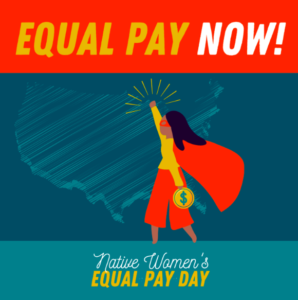
Image: Native Women Lead
On average, Native American women are paid only 51 cents to every dollar earned by white, non-Hispanic men. This wage gap includes both full-time, year-round workers and as part-time workers.
Nearly three out of ten Native American women worked frontline jobs through the worst of the COVID-19 pandemic—hailed as heroes—and yet their wage gap has widened even since then.
Of course, the grim reality of Native American women working more for less preceded the pandemic by hundreds of years and, like other expressions of discrimination against Native Americans such as the shameful legacy of forced displacement and family separation, is a policy choice.
Pennsylvania soil is stained with these sins. One notorious example is the Carlisle Indian Industrial School in Carlisle. Located about a half-hour drive from the Capitol in Harrisburg and opened in 1879, Carlisle Indian Industrial School was the first government-run boarding school that housed and systematically tortured Native children forcibly separated from their families as part of a “forced assimilation” plan. It served as a model for hundreds of similar projects, inflicting generations of trauma onto Native American families. More than a century after the facility closed, the project of returning the bones of Native children who died there to rest with their families is still incomplete.
While no policy could absolve the horror of the historic treatment of Native families, ensuring equitable pay for Native women is one simple but important policy effort that would enable more Native families to achieve economic security.
And yet, neither Congress nor the Pennsylvania Legislature has updated equal pay policies to provide better protection against this form of insidious and perpetual discrimination. Two-thirds of Native American mothers are the primary breadwinners and forty percent single breadwinners. Among all other ethnic groups, Native American female-headed families with children had the highest poverty rate, with more than two in five living in poverty.
A fourth attempt to pass the federal Paycheck Fairness Act in Congress failed, once again, to pass into law last year.
Here in Pennsylvania, we have been unsuccessfully advocating to close loops in the state equal pay law for about a decade.
A new two-year legislative session with new lawmakers begins soon and we will once again ask you to join us in advocating to close the loopholes in state law that enable wage discrimination. Stay tuned.
Women’s Law Project is a public interest law center in Pennsylvania devoted to advancing and defending the rights of women, girls, and LGBTQ+ people in Pennsylvania and beyond. As a non-profit organization, we can not do this work without you.
We are a non-profit organization! Please consider supporting our work.
Sign up for WLP’s Action Alerts. Stay up to date by following us on twitter, Facebook, and Instagram. You can contact us here.


